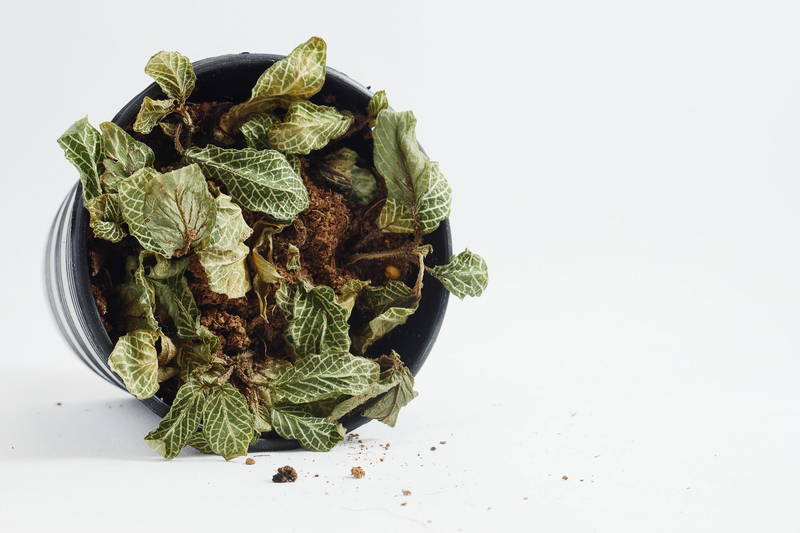Eco-Friendly Transformation of Waste to Soil
Posted on 03/09/2025
Eco-Friendly Transformation of Waste to Soil: A Sustainable Approach for a Greener Future
Every year, millions of tons of organic waste are generated worldwide, most of which ends up in landfills, emitting greenhouse gases and causing environmental pollution. However, with growing environmental awareness and scientific advancements, transforming waste into nutrient-rich soil has emerged as a sustainable, eco-friendly solution. In this article, we will embark on an in-depth exploration of the eco-friendly transformation of waste into soil, highlighting techniques, benefits, challenges, and innovative practices that are changing the face of sustainable agriculture and waste management.

What Does "Eco-Friendly Transformation of Waste to Soil" Mean?
At its core, the eco-friendly transformation of waste to soil involves converting biodegradable waste--such as food scraps, yard trimmings, paper, and certain industrial by-products--into fertile soil or compost, utilizing natural decomposition processes. This practice not only reduces landfill waste but also recycles valuable nutrients back into the earth, promoting a healthier, more sustainable ecosystem.
Why Is Waste-to-Soil Conversion Important?
- Reduces Greenhouse Gas Emissions: When organic waste breaks down in landfills, it produces methane, a potent greenhouse gas. Composting and soil transformation processes drastically cut these emissions.
- Minimizes Landfill Use: Diverting organic matter from landfills conserves valuable land resources and helps cities manage waste more effectively.
- Enriches Soil: Compost and transformed soil improve soil structure, fertility, water retention, and microbial activity, essential for sustainable agriculture.
- Supports Circular Economy: Turning waste into valuable soil resources closes the loop in nutrient cycles, making communities more resilient and sustainable.
Methods for Eco-Friendly Waste Transformation into Soil
Various methods are available for converting waste into beneficial soil amendments, each with distinct advantages and applications. The choice of method depends on the type of waste, available technology, scale, and environmental considerations.
Composting: The Classic Eco-Friendly Solution
Composting is one of the most widely adopted and efficient methods for the eco-friendly transformation of waste into soil. It's a natural process in which microorganisms break down organic materials into dark, crumbly, nutrient-rich compost that can be directly applied to gardens and farms.
Types of Composting:
- Backyard Composting: Ideal for households, this method involves collecting kitchen and garden waste and managing it in piles or bins, ensuring periodic aeration and moisture.
- Vermicomposting: This technique uses specific earthworms (often Red Wigglers) to digest organic matter rapidly and efficiently, producing crumbly "vermicompost" that boosts soil health.
- Industrial or Large-scale Composting: Facilities process tons of food waste, yard debris, and agricultural by-products using advanced aeration and temperature regulation to produce high-quality compost.
Anaerobic Digestion: Harnessing Microbes Without Oxygen
Anaerobic digestion involves breaking down organic material in a sealed environment devoid of oxygen. Specialized bacteria convert waste into biogas (methane and CO2) and digestate. The digestate byproduct, rich in nutrients, can be processed and used as a soil amendment. This approach is particularly effective for treating food waste, agricultural residues, and sewage sludge.
Bokashi Fermentation: Fermenting Waste with Beneficial Microbes
Bokashi fermentation is a Japanese technique involving the controlled fermentation of organic waste using Effective Microorganisms (EM). Unlike traditional composting, bokashi can process most food types, including meat and dairy, and produces a pre-compost that, when buried in soil, accelerates decomposition and soil enrichment.
Black Soldier Fly Larvae Composting: Insects Transforming Waste
Increasingly popular for urban and industrial waste management, black soldier fly larvae composting uses larvae to consume and break down organic wastes at astonishing speeds. The resulting residues serve as a soil amendment, while the larvae can be processed into high-protein animal feed.
The Science Behind Waste-to-Soil Sustainable Practices
The eco-friendly transformation of waste to soil depends on natural biological processes carried out by bacteria, fungi, protozoa, and invertebrates. The science involves controlled decomposition and nutrient cycling:
- Aerobic Decomposition (Composting): Oxygen-fueled microorganisms break down organic matter into stable humus, water, and carbon dioxide.
- Anaerobic Decomposition: Absence of oxygen leads to methane and a nutrient-rich sludge, suitable for further soil application after treatment.
- Vermicomposting: Earthworms digest and fragment waste, increasing microbial action and producing nutrient-dense castings.
- Fermentation (Bokashi): Microbes convert sugars into lactic acid, expediting decomposition once the material is mixed with soil.
Materials Suitable for Eco-Friendly Waste-to-Soil Processes
The key to successful transformation lies in using the right raw materials. Common inputs include:
- Food scraps: Vegetable peels, fruit waste, coffee grounds, eggshells, and grains.
- Yard waste: Leaves, grass clippings, twigs, and garden trimmings.
- Paper products: Non-glossy paper, cardboard, and unbleached napkins (avoid inks and coatings).
- Agricultural residues: Crop wastes, husks, corn cobs, and animal bedding.
- Certain manure and animal waste: From herbivores (cows, horses, rabbits, etc.), cured for pathogen reduction.
Note: Avoid composting meat, dairy, oils, diseased plants, or pet waste (from carnivores) in basic systems due to odors, pests, and pathogen risks. Industrial or specialized methods can process a wider range of materials.
Benefits of the Eco-Friendly Waste-to-Soil Revolution
Adopting eco-friendly waste transformation practices ushers in an array of environmental, economic, and social benefits:
Benefits for the Environment
- Minimizes Pollution: Reduces harmful leachates and methane from landfills.
- Restores Soil:** Recycles nutrients, enhancing soil fertility, texture, and water holding capacity.
- Fosters Biodiversity: Supports beneficial soil microorganisms and macrofauna, leading to healthy crops and ecosystems.
- Reduces Chemical Usage: High-quality compost can often substitute for synthetic fertilizers and pesticides.
Economic and Social Advantages
- Reduces Waste Management Costs: Diverts waste from expensive landfill tipping and processing fees.
- Promotes Circular Economy: Converts waste into local resources, creating green jobs and economic resilience.
- Enhances Food Security: Improves soil quality, boosting yields and resilience to climate extremes.
- Builds Community Engagement: Community composting initiatives educate and empower residents to participate in sustainability efforts.
Overcoming Challenges in Waste-to-Soil Transformation
Achieving successful, eco-friendly soil generation from waste is not without its obstacles:
- Contamination: Non-organic materials (plastics, metals) in waste streams can compromise soil quality and safety. Effective sorting is crucial.
- Odors and Pests: Poorly managed compost may attract pests or emit unpleasant smells; proper techniques and maintenance are essential.
- Public Awareness: Many communities lack knowledge or motivation to separate waste and support composting programs.
- Regulation: Some jurisdictions lack clear guidelines or infrastructure, limiting composting facilities and end uses.
- Market Demand: Developing markets for compost and other soil products is vital for long-term viability.
Solutions involve coordinated efforts in education, improved infrastructure, technology adoption, and policy support to encourage widespread eco-friendly waste conversion.
Innovative Technologies in Eco-Friendly Waste Transformation
Technological innovation is fast-tracking the eco-friendly transformation of waste into soil. Key developments include:
- Automated Sorting Systems: AI-powered sensors and robots separate contaminants from compostable waste, improving end product quality.
- In-vessel Composting Units: Closed systems offer precise control of temperature, moisture and aeration, suitable for cities and food processors.
- Bioreactors and Digesters: Advanced anaerobic digesters extract energy and nutrients from high-moisture wastes.
- Mobile and Modular Compost Units: Portable facilities allow small communities or businesses to compost on-site, reducing transportation emissions.
- Digital Platforms: Apps connect waste producers with composters or soil buyers, fostering a local resource economy.
Case Studies: Eco-Friendly Waste-to-Soil in Action
Citywide Curbside Compost Collection -- San Francisco, USA
San Francisco implemented mandatory compost collection for residents and businesses, diverting hundreds of thousands of tons of organics each year. The resulting compost supports regional agriculture and parks, demonstrating large-scale urban potential for eco-friendly waste transformation.
Community-Based Compost Hubs -- Bengaluru, India
Grassroots initiatives in India's urban centers have built neighborhood-level composting hubs, managed by local women cooperatives. These hubs handle organic waste from thousands of homes, helping alleviate landfill pressure and producing affordable soil amendments for urban agriculture.
Industrial Bio-Digestion -- Copenhagen, Denmark
Copenhagen utilizes advanced anaerobic digesters to convert city food waste and sewage sludge into both renewable energy and digestate used as fertilizer for local farms, closing the loop in urban resource management.
How to Start Transforming Waste to Soil at Home or in Your Community
Home Composting Guide
- Choose a Composting System: Select from pile, bin, tumbler, or vermicomposting based on available space and volume of waste.
- Collect Appropriate Materials: Mix greens (fruit and veggie scraps, coffee grounds) with browns (dry leaves, cardboard).
- Maintain the Pile: Turn regularly to aerate, add water as needed, and monitor for odors or pests.
- Harvest Compost: After 2-12 months, use the dark, crumbly compost to feed your garden, pots, or lawns.
Community Scale Actions
- Set Up Shared Compost Sites: Coordinate with neighbors or schools to develop communal bins or drop-off sites.
- Partner with Local Farms or Gardens: Deliver finished compost to urban farms and gardeners as a valuable, sustainable resource.
- Advocate for Curbside Organics Collection: Petition local authorities to adopt green bin programs for neighborhoods.

Looking Forward: The Future of Eco-Friendly Waste to Soil Practices
As urbanization intensifies and the urgency to combat climate change grows, eco-friendly transformation of waste to soil stands out as a crucial, scalable solution. Policy incentives, public-private partnerships, technological advancements, and public engagement will be vital to fully realizing the potential of this green revolution. Every household, neighborhood, and farm has a role to play in closing the food-waste-soil loop and protecting our planet for future generations.
Conclusion: Join the Eco-Friendly Waste-to-Soil Movement
Transforming waste into fertile soil isn't just an eco-friendly action--it's an investment in a sustainable future for all. By embracing methods like composting, anaerobic digestion, and new soil regeneration technologies, communities can reduce environmental impact, save money, and build healthier, more resilient food systems. Whether you're a homeowner, farmer, policymaker, or entrepreneur, there's never been a better time to join the eco-friendly waste-to-soil transformation and help cultivate a richer, greener earth.
Ready to get started? Learn more, spread awareness, and put your organic waste to work for the planet today!
Latest Posts
Fast-Growing Hedges: 9 Privacy Boosters to Consider
Container gardening for beginners: What to know
The Art of Zen: Designing a Peaceful Garden Retreat



